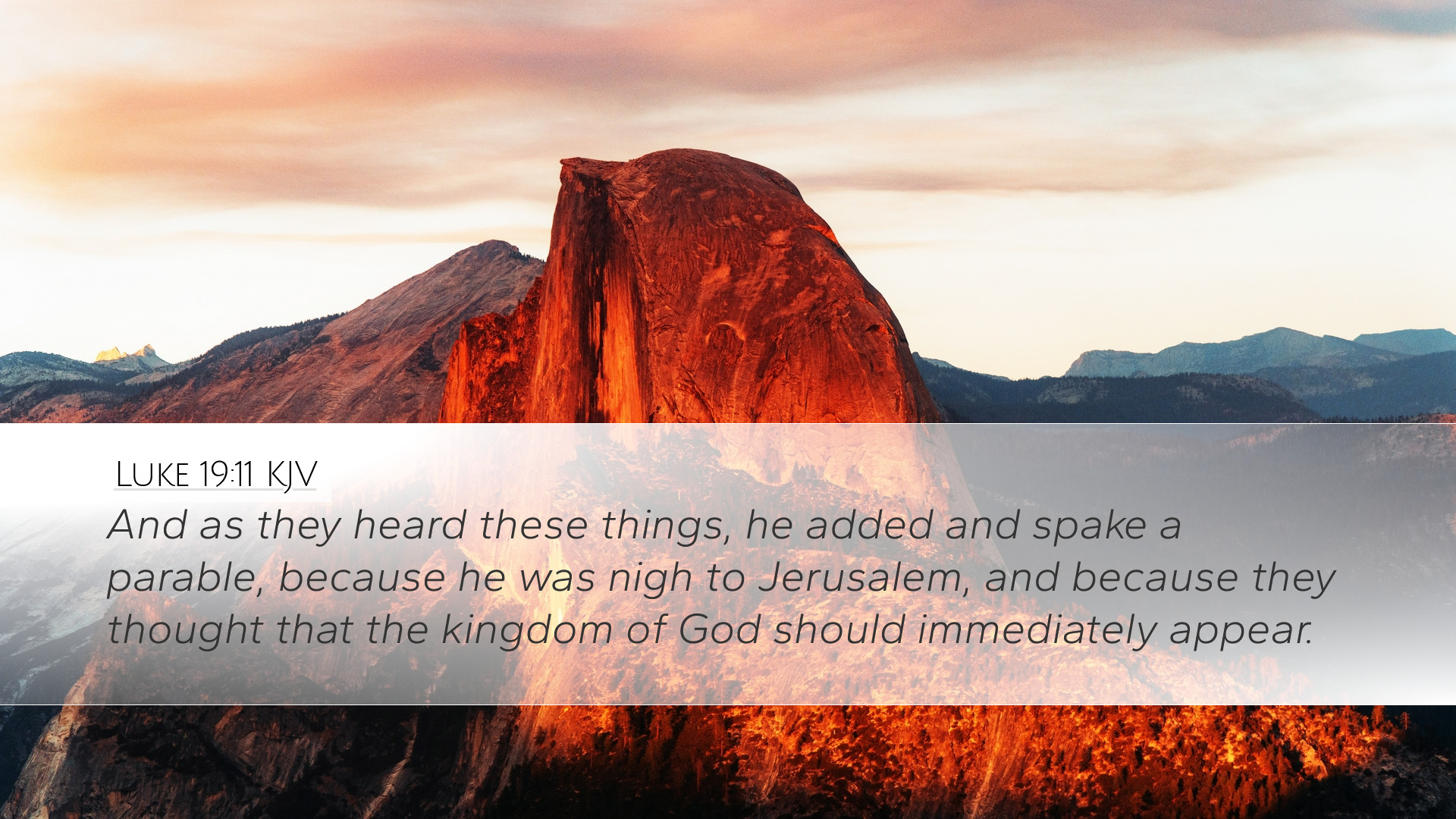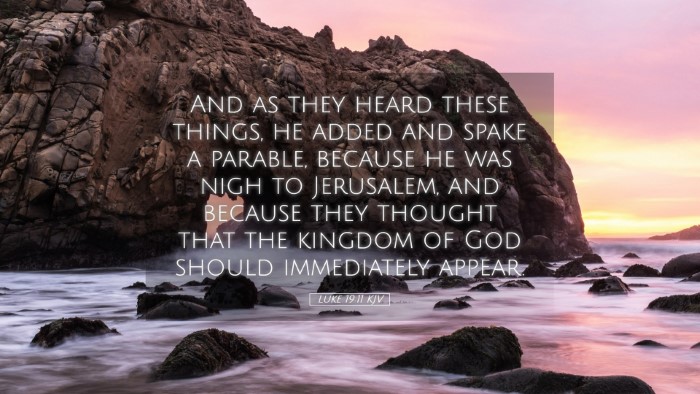Commentary on Luke 19:11
Luke 19:11 states: "While they were listening to this, He went on to tell them a parable because he was near Jerusalem and the people thought that the Kingdom of God was going to appear at once." This verse provides a rich context for understanding the parable that follows, reflecting the expectations and misconceptions of those who were following Jesus. The commentary below draws insights from the works of Matthew Henry, Albert Barnes, and Adam Clarke to elaborate on its implications.
Context of Luke 19:11
Historical Background: This verse appears just prior to Jesus’ triumphal entry into Jerusalem, a pivotal moment in the Christian narrative. The crowd was filled with anticipation, believing the Messiah would establish His kingdom immediately. This expectation prompts Jesus to tell a parable that will correct their misunderstandings about the nature of His kingdom.
Theological Implications: The expectation of an immediate earthly kingdom reflects a common misunderstanding of the messianic role. The parable that follows serves to teach the disciples the importance of faithfulness and stewardship in the period of the King’s absence.
Insights from Commentaries
Matthew Henry
Exposition of the Context: Henry highlights the significance of Jesus' decision to share a parable at this critical moment. He emphasizes that Jesus was aware of the hearts and minds of those gathered, knowing their longing for an immediate kingdom.
Lessons on Kingdom Expectations: According to Henry, the parable illustrates the delay of the kingdom establishment and the importance of preparation. His commentary emphasizes that the followers of Christ must not be disheartened by the apparent absence of the kingdom but should remain active in their faith and responsibilities.
Albert Barnes
Clarification of Misconceptions: Barnes adds depth by stressing that this parable was directed toward those who were perceiving the kingdom through a political lens. He notes how the Jewish people expected a Messiah who would deliver them from Roman oppression rather than providing a spiritual salvation.
Call to Stewardship: In Barnes' analysis, the focus shifts to the practical implications of being faithful stewards in the absence of the King. He explains that the servants in the parable represent believers who are entrusted with various gifts and responsibilities. The key takeaway is accountability upon the King’s return.
Adam Clarke
Interpreting the Parable's Set-Up: Clarke provides scholarly insights into the cultural context of money and investments, drawing parallels between the parable and contemporary practices of the time. He notes that the reference to "minas" symbolizes differing amounts of responsibility assigned to each servant.
Encouragement for Active Engagement: Clarke emphasizes that the servants' responses to their given tasks reflect the broader Christian duty to actively engage in kingdom work. He asserts that each believer is responsible for utilizing their unique gifts for the glory of God until Christ's return.
The Significance of the Parable
Jesus' parable following Luke 19:11 serves to transform the disciples' expectations. The key themes of stewardship, accountability, and the delay of the kingdom challenge their immediate hopes while also assuring them of future reward for their faithfulness.
Stewardship
- Definition: Stewardship refers to managing something on behalf of another. In this scripture, it pertains to the believers managing their faith, gifts, and resources.
- Application: Pastors and theologians can draw from this concept to engage congregants in discussions about how they can best serve and grow the church in preparation for Christ’s return.
Accountability
- Understanding Accountability: The idea that believers are accountable for their actions is central to Christian teaching. Each servant’s response to the nobleman’s request underscores the reality of judgment based on faithfulness.
- Implications for Leadership: Church leaders are encouraged to reflect on how they present the responsibilities of their congregants, creating an environment that fosters growth and accountability.
Delay of the Kingdom
- Rethinking Expectations: The delay of the kingdom invites believers to remain hopeful yet diligent in their mission rather than complacent.
- Focus on the Eternal: Scholars may encourage a perspective shift that maintains eternal priorities in light of temporal challenges.
Concluding Thoughts
The commentary on Luke 19:11, along with the parable that follows, serves as a vital teaching moment for believers, inviting them into a deeper understanding of what it means to live in anticipation of the kingdom while actively engaging in stewardship and accountability. This text is not merely historical but carries ongoing relevance and application for today's church.


